laguardia performing arts center rough draft festival lic queens nyc rough draft theater fest queens nyc
How We Hear @ Rough Draft Theater Festival
New Play Explores the Changing Nature of our Political Dialogue
 April 9, 2018 / Long Island City Neighborhood LIC / LaGuardia Performing Arts Center / Experimental Theater in Queens / Queens Buzz NYC.
April 9, 2018 / Long Island City Neighborhood LIC / LaGuardia Performing Arts Center / Experimental Theater in Queens / Queens Buzz NYC.
Last weekend I had an opportunity to watch one of the new plays performed at the 5th Rough Draft Festival at the LaGuardia Performing Arts Center in LIC. The play was entitled How We Hear by Emily Lyon.
It was an exploratory exposition of how the American national dialogue has changed over the past century and a half [158 years], and it was as much an experience, as it was a performance.
What Lyon did with the next hour and half of our time was an interesting journey through selected excerpts of our national debate. But even more importantly, Lyon took us on an exploratory journey that included some real time processing of new forms of mass media. The incredible proliferation of information venues and news access over the past few decades, has inundated our ability to process the news, and stunted our ability to have an honest dialogue about the important issues facing our society, in a manner that everyday Americans are able to manage.
Lincoln Douglas Debates @ LaGuardia Performing Arts Center
I arrived shortly before the performance began and found a seat not far from the stage. The performance was given a short introduction by Handan Ozbilgin, the Rough Draft Festival Director and shortly thereafter, one of the seven Lincoln-Douglas debates of 1858 [August 21 – October 15] began. The debates were the first ever between two Senate candidates vying to for a U.S. Senate seat [Illinois]. They became an instant sensation, and became the forerunner of the platform upon which Lincoln would run for president in 1860. It’s worth noting that at the time the Senators were elected by state legislatures – not by a direct tally of state citizens’ votes.
How We Hear by Emily Lyon @ Rough Draft Festival
 While Triney Sandoval, the Hispanic man who played Douglas, didn’t resemble Stephen Douglas facially, he was an actor and orator of the first degree, and comported himself as one might imagine Douglas. His elocution and diction were very precise, cadenced and reminiscent of an earlier age. And his Hispanic heritage, in what was – over a century and a half ago – an Anglicized age, seemed purposeful in adding an ethnic layer and some complexity, to what was possibly a simpler - although not fairer - time.
While Triney Sandoval, the Hispanic man who played Douglas, didn’t resemble Stephen Douglas facially, he was an actor and orator of the first degree, and comported himself as one might imagine Douglas. His elocution and diction were very precise, cadenced and reminiscent of an earlier age. And his Hispanic heritage, in what was – over a century and a half ago – an Anglicized age, seemed purposeful in adding an ethnic layer and some complexity, to what was possibly a simpler - although not fairer - time.
Sandoval, as Douglas, talked about the Lecompton Constitution, which was one of the hot issues of the time. The Lecompton Constitution was a competing pro-slavery constitution - for the state of Kansas induction into the United States. The Lecompton Constitution explicitly stated that only white males would have the right to vote.
Ironically, Stephen Douglas, a Democrat, helped the Republicans defeat the pro-slavery constitution by aligning with the other northern Democrats who were against it. This split the party at the time, as the southern Democrats were supportive of the pro-slavery Lecompton Constitution.
States Rights Vs Human Rights: Early American Hypocrisy or Dialectic?
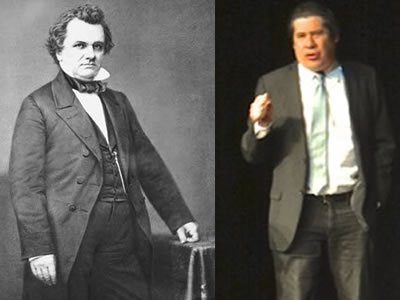 Sandoval, as Douglas, then went on to accuse Lincoln and the Republican Party of being a northern political party – not a national political party like the Democrats were. Douglas then cited excerpts from speeches made by Lincoln which seemed at odds with each other. In some speeches Lincoln seemed to appeal to the anti-slavery sentiment of the northern cities [while speaking in Chicago], and Lincoln seemed guilty of appealing to the racial prejudice of the southerners, while speaking in southern Illinois cities like Charleston [which is about the same latitude as St. Louis, Missouri and Kansas City]. In Lincoln's southern speeches, he stated that he did not support allowing Black men to become whites' equals, citing that Blacks weren’t fit for the role of jurors and what not.
Sandoval, as Douglas, then went on to accuse Lincoln and the Republican Party of being a northern political party – not a national political party like the Democrats were. Douglas then cited excerpts from speeches made by Lincoln which seemed at odds with each other. In some speeches Lincoln seemed to appeal to the anti-slavery sentiment of the northern cities [while speaking in Chicago], and Lincoln seemed guilty of appealing to the racial prejudice of the southerners, while speaking in southern Illinois cities like Charleston [which is about the same latitude as St. Louis, Missouri and Kansas City]. In Lincoln's southern speeches, he stated that he did not support allowing Black men to become whites' equals, citing that Blacks weren’t fit for the role of jurors and what not.
Stephen Douglas was a Democrat, but he wasn’t pro-slavery per se. He was for the rights of states to decide for themselves what institutions to create and how they should conduct their business. He noted that all of the Founding Fathers had kept their slaves through the Revolutionary War. And Douglas reminded voters of Lincoln’s speech in 1858 in Springfield, Illinois where he said that “A house divided against itself cannot stand.” And that one day the United States would either be all slave or all free.
CLICK here to read the rest of our report of the LaGuardia Performing Arts Rough Draft Festival performance of How We Hear.
How We Hear @ Rough Draft Theater Festival
New Play Explores the Changing Nature of our Political Dialogue
 April 9, 2018 / Long Island City Neighborhood LIC / LaGuardia Performing Arts Center / Experimental Theater in Queens / Queens Buzz NYC. Continued.
April 9, 2018 / Long Island City Neighborhood LIC / LaGuardia Performing Arts Center / Experimental Theater in Queens / Queens Buzz NYC. Continued.
As an aside, it’s worth noting that the importation of slaves was made illegal in 1807 and enacted in 1808, which was the earliest date made possible in the Constitution [Google]. And that in the 20 years time between when that statement was embedded in the Constitution, and the time when importing slaves became illegal, about 20% of all slaves over the prior two centuries were imported into the United States [Wikipedia].
Mr. Lincoln was played by Lindsay Tanner, who had yet to speak. And while she did not look like Abraham Lincoln, she was also a worthy elocutionist.
Kennedy Nixon TV & Radio Debates of 1960 @ LaGuardia Performing Arts Center
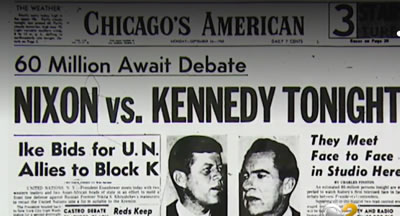 We were then whisked forward a full century through space and time, into the Washington, D.C. NBC television studio on October 7th, 1960 - where the second-ever televised broadcast of two presidential candidates was held [the first was held on September 26th 1960 at WBBM-TV in Chicago]. The first Kennedy-Nixon debate of 1960 [there were four debates in total], like the Lincoln-Douglas debate, turned out to be a popular sensation.
We were then whisked forward a full century through space and time, into the Washington, D.C. NBC television studio on October 7th, 1960 - where the second-ever televised broadcast of two presidential candidates was held [the first was held on September 26th 1960 at WBBM-TV in Chicago]. The first Kennedy-Nixon debate of 1960 [there were four debates in total], like the Lincoln-Douglas debate, turned out to be a popular sensation.
Lindsay Tanner, a female, played John F. Kennedy, and she gave his opening statement. In her / his statement, Kennedy harked back to the Lincoln-Douglas debates, where the question was will the United States be a nation with slavery or a nation free of slavery. Kennedy then framed the debates of 1960 as one where the electorate would decide whether America will be a free society or a Communist-style totalitarian controlled society. Kennedy’s speech included making a case for SOCIAL RESPONSIBILITY in addition to INDIVIDUAL RESPONSIBILITY. And he noted that part of doing the socially responsible thing, was to make sure the promises embedded in the U.S. Constitution, weren’t just empty words.
Juxtaposing Different Races & Genders on Historical Figures
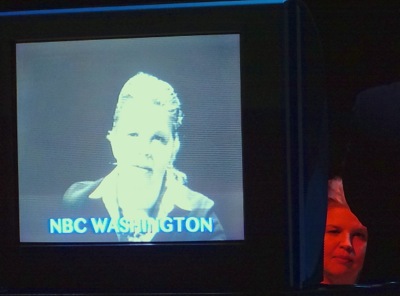 Nixon was played by an African American Reynaldo Piniella. Nixon responded to Kennedy’s push to do more / do better, by telling listeners that the economy under the Eisenhower Administration - which he, Nixon, was a part of - had grown the economy faster than the prior Democratic Administration led by Harry S. Truman. He said that he and Ike had a record not to stand on, but to build on, and that he believed Senator Kennedy and he agreed upon what was good for the nation, but differed on how they planned to get there.
Nixon was played by an African American Reynaldo Piniella. Nixon responded to Kennedy’s push to do more / do better, by telling listeners that the economy under the Eisenhower Administration - which he, Nixon, was a part of - had grown the economy faster than the prior Democratic Administration led by Harry S. Truman. He said that he and Ike had a record not to stand on, but to build on, and that he believed Senator Kennedy and he agreed upon what was good for the nation, but differed on how they planned to get there.
Nixon went on to advocate for more federal money to help integrate schools, that Negroes had a right not just to buy in stores, but also to have a coke at the counters in snack shops there, and that the workers had a right to strike. Nixon also accused Kennedy of tailoring his message to northern and southern states, which Nixon said he did not do that himself. He said that the United States shouldn’t let Russia succeed in dividing America based on race.
Kennedy continued on the offensive noting the huge disparities in educational attainment, employment and housing based on race. He said that the president needs not just to exert government leadership, but also moral leadership.
The Trump Clinton TV & Twitter Debate of 2016
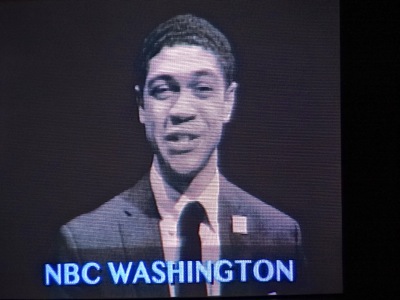 Once again we were whisked forward through time and space to Hofstra University in September of 2016 when Hillary Clinton and Donald Trump squared off in the first 2016 presidential debate. We watched a short clip of that debate, as well as of Obama & Bill Clinton in commercials, and a video clip of Trump doing his World Wrestling Federation takedown of CNN in the summer of 2017 - after Trump had become the president.
Once again we were whisked forward through time and space to Hofstra University in September of 2016 when Hillary Clinton and Donald Trump squared off in the first 2016 presidential debate. We watched a short clip of that debate, as well as of Obama & Bill Clinton in commercials, and a video clip of Trump doing his World Wrestling Federation takedown of CNN in the summer of 2017 - after Trump had become the president.
After the clips were shown, the actors played themselves, discussing how to proceed characterizing the political discussion / mess of today. Once again ethnicity and gender were juxtaposed upon historical figures as Lindsay played Donald Trump, who has a reputation as a lecherous man and then Triney played Donald Trump, who has also earned a reputation for racism. Similar juxtapositions were done for anchorman Lester Holt, who was first played by Reynaldo and then Triney.
Things were getting pretty confusing as to who was who. The pace of the speech had picked up considerably from the slower, more civil, more respectful debates of the prior centuries.
Civil discourse turned into one disrespectful interruption after another. The candidates – Hillary & Donald - are shown talking about trade exports, deregulation and cutting taxes in a bickering style reminiscent of an old cranky couple who have spent their entire lives picking at each other - living a life of no boundaries. It also wasn't just a debate of no boundaries, but also of no respect, and no interactive listening. It was a debate where the candidates were just grandstanding and talking past each other - but also quite likely – talking past the audience too.
It felt like that throughout 2016, and it still feels like that now. The disrespectfulness lives on.
Where Are We Now? Trying to Make Sense of a Chaotic World
Tweeting and the social media arrived on the scene in full force.
The actors play themselves trying to regroup and are challenged again to find their way forward. There’s so much audio, visual crap coming off the stage, that it has become a cacophony of political fecal soundbytes … and it felt very much like where we are today. Trying to separate the myriad of sound bytes and narratives coming at us, from all sides, via every device, in a continual overdose of fairly unreliable, highly irritating, aggressive idiocy.
Analyzing Turning Points in American Political Discourse in the Context of New Technologies
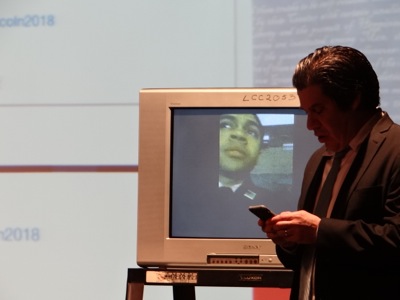 The actors again resumed their roles as actors, trying to figure out where to go with this play ... regrouping to ponder their way forward. They talk about how FDR used the radio to reach American voters because it was the medium of the day. That the press respectfully did not show photos of FDR in a wheelchair to the American public, despite the veracity of his handicap, as FDR had contracted polio years earlier and had great difficulty walking.
The actors again resumed their roles as actors, trying to figure out where to go with this play ... regrouping to ponder their way forward. They talk about how FDR used the radio to reach American voters because it was the medium of the day. That the press respectfully did not show photos of FDR in a wheelchair to the American public, despite the veracity of his handicap, as FDR had contracted polio years earlier and had great difficulty walking.
They talked about how Nixon was perceived to have won the first 1960 Presidential debate by those who had heard it over the radio, while those who had watched it on television [65 million] felt that Kennedy had won the debate because Kennedy looked far more composed [Nixon was sweating under the bright hot lights of the television studio and did not use studio make up].
Finally the actors started talking about where we are today. How Trump had effectively used Twitter to bypass the filtering press to go directly to the American people. The actors opined that the social media was instrumental in helping Trump win the presidency.
[I have my own theory about what propelled Trump into the presidency, which you can read in our series on Rupert Murdoch and the Rise of the 21st Century Propaganda Press which provides another alternative view.]
The actors discussed listening to people, versus watching people, versus viewing them on social media. Someone said it’s hard to not watch Trump, but it’s pretty easy not to listen to him. There was something about the messages being tailored for different parts of the nation – in an accusation reminiscent of Nixon's and Douglas's vis a vis their challengers Kennedy and Lincoln. The actors noted that political theater and the national conversation appear to have devolved into ridiculous entertainment in place of any kind of serious discussion about public policy and societal evolution.
Lindsay then returned to her Lincoln character and started giving his speech of 1858. Meanwhile the TV, sound system and tweets kept flowing in the background. The torrents of the unrelenting, ubiquitous, so utterly annoying cacophony of American political theater had finally succeeded in tuning me out. I didn’t hear a word she said. I didn’t want to.
And then "Whew". It was over.
The Audience Weighs in ... Just as they do Today Using Social Media
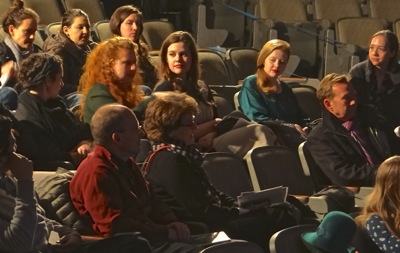 As I said, this play was a real experience that was quite successful in conjuring up my annoyance with the 2016 Presidential Campaign. The topic chosen by Emily Lyon is a very relevant and important one and the interest shown by the audience was high. Most of the audience stayed after the show ended to discuss what they’d seen, heard and experienced. Handan returned with the Creator and Director, Emily Lyon, for a discussion of this new play.
As I said, this play was a real experience that was quite successful in conjuring up my annoyance with the 2016 Presidential Campaign. The topic chosen by Emily Lyon is a very relevant and important one and the interest shown by the audience was high. Most of the audience stayed after the show ended to discuss what they’d seen, heard and experienced. Handan returned with the Creator and Director, Emily Lyon, for a discussion of this new play.
The discussion included some pondering of whether we would ever return to the more respectful, cadenced conversation of an earlier age - or if we were going to continue to be subjected to this relentless torrent of sound bytes and tweets.
I opined that individuals will make that choice on their own. People can choose to continue accessing the omnipresent, relentless noise of the mainstream media, or they can cut the umbilical cord and go looking for alternate sources of information that are more thoughtful, more respectful and more informative. Both options exist and likely will continue to exist.
Experiential Theater - Living Thru the Virtual Reality of Multi-Media
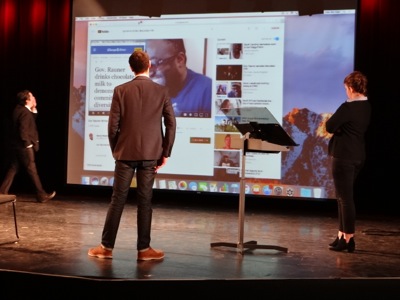 Someone noted that this was as much an experience as a play.
Someone noted that this was as much an experience as a play.
Another mentioned the recent stories about how Sinclair Broadcasting has been employing the propagandistic practice of requiring the reading of corporate dictated narratives by local television news people.
Somebody talked about how the gender and ethnicity swapping by the actors, in the characters they played, was a bit disorienting. Discombobulating if you will.
Somebody said there are now so many mediums, and likely more to come.
And someone said something about people trying to determine what they heard, versus what - they themselves - think.
All in all there was plenty of food for thought. And Emily Lyon certainly picked a topical and interesting theme.
Many Thanks to the LaGuardia Performing Arts Center & All Those Who Contributed
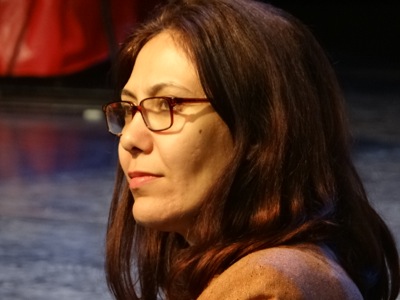 Kudos to Emily Lyon and the cast including Reynaldo Piniella, Triney Sandoval and Lindsay Tanner. Also thanks to Handan Ozbilgin, Rough Draft Festival Director, and Steven Hitt, the LaGuardia Performing Arts Center Artistic Producing Director. Congratulations to them on their fifth season of an engaging, informative and entertaining theater.
Kudos to Emily Lyon and the cast including Reynaldo Piniella, Triney Sandoval and Lindsay Tanner. Also thanks to Handan Ozbilgin, Rough Draft Festival Director, and Steven Hitt, the LaGuardia Performing Arts Center Artistic Producing Director. Congratulations to them on their fifth season of an engaging, informative and entertaining theater.
There are two more weeks remaining to the Rough Draft Festival at the LaGuardia Performing Arts Center in Long Island City. Go to http://lpac.nyc for further info.
LIC Neighborhood Related Info
Click here to go to the LIC real estate section of this site.
Click these links for promotions by advertisers in Queens.
Click this link to go to the LIC Neighborhood.
Site Search Tips. 1) For best results, when typing in more than one word, use quotation marks - eg "Astoria Park". 2) Also try either singular or plural words when searching for a specific item such as "gym" or "gyms".
$element(bwcore,insert_search,N)$
Click this link to search for something in our Queens Business Directory.
$element(adman,groupads,Sectional Ad)$
Click the log in link below to create an ID and post an opinion.
Or send this story to a friend by filling in the appropriate box below.













